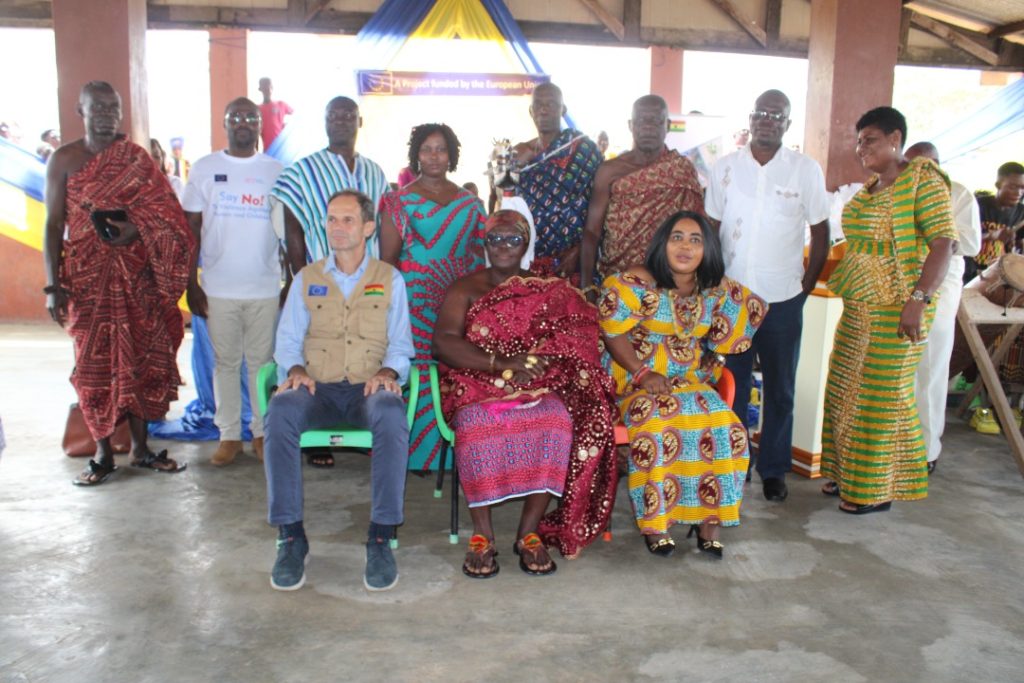By Isaac Arkoh
Cape Coast, Sept. 05, GNA – As part of efforts to reduce gender disparity and violence particularly against women and children, Hen Mpoano, a coastal Non-Governmental Organization (NGO), has launched Women in Fisheries Against Violence (WIFVEs) project.
The three-year project is intended to achieve gender equality in fishing by advocating against Gender-Based Violence (GBV), and discrimination in Ghana’s marine fisheries sector.
The project is funded within the context of the European Instrument for Democracy and Human Rights (EIDHR), an EU programme that aimed to promote democracy and human rights worldwide through civil society initiatives in third countries outside the European Union.
The EU’s support to the WIFVE’s project seeks to support activities linked to the priority areas defined by the EU Delegation to Ghana in the Human Rights Country Strategy as well as in the adopted EU Gender Action Plan III (2021-2025) on thematic area “Ensuring freedom from all forms of gender-based violence”.

Addressing some selected fishers at the launch of the project at Anomabo in the Mfantseman Municipality, Mrs Adiza Ama Owusu, Project Manager of the WiFVEs said the project had been designed to be implemented in 18 marine fishing communities in the Central and Western Regions.
She said it would also give entrepreneurship and livelihood skills to women at risk and victims of GBV in the in Central and Western Regions.
The move, would be achieved in collaboration with the Central and Western Fishmongers Improvement Association (CEWEFIA) as its partner.
In addition, she said Hen Mpoano was also working to address challenges with food insecurity, climate change, over-fishing, urbanisation, and poverty.
She regretted the fact that, domestic violence was a palpable feature in many homes across the country as against the backdrop of many women who have distinguished themselves in their fields of endeavour.
However, GBV was disproportionately and most often tilted against women who, by the nature of their physique, bear the brunt of the brutality and brawn of some men who are uninitiated and lack the requisite knowledge and sensitization.
Outlining some project expectations, she said the WiFVE’s would address SGBV through interventions such as developing and implementing an advocacy strategy and communication campaigns.
That would be underpinned by rigorous assessments to uncover the drivers and dynamics of gender-based violence in fishing communities.
It will strengthen systems and promoting measures for reporting physical violence and abuses, supporting survivors of sexual and physical violence.
Also, prosecuting perpetrators of violence against women and enhance access to social services and livelihood opportunities for survivors and those at risk of GBV.
Mrs Owusu stressed the undeniable fact that more needed to be done to prevent domestic violence, disproportionately faced by women from their male counterparts.
“Such violence includes the verbal and vitriolic attacks on women who ascend high positions in public service,” she started.
Mr Jesitan Tetteh Sanakey, the Central Regional Director of the Fisheries Commission (FC), assured that his outfit does not consider violence against women and girls a social canker only, but a developmental challenge which affects a large chunk of the Ghanaian population and their contribution to national development.
Madam Grace Ansah, a participant at an interview stated that free medical care for victims of sexual and gender-based violence is long overdue.
According to her, although it was stipulated in the Domestic Violence Act for a Domestic Violence Support Fund to be established to provide free medical care for girls and women who suffered as a result of sexual abuse and gender-based violence, it was still not operational.
GNA